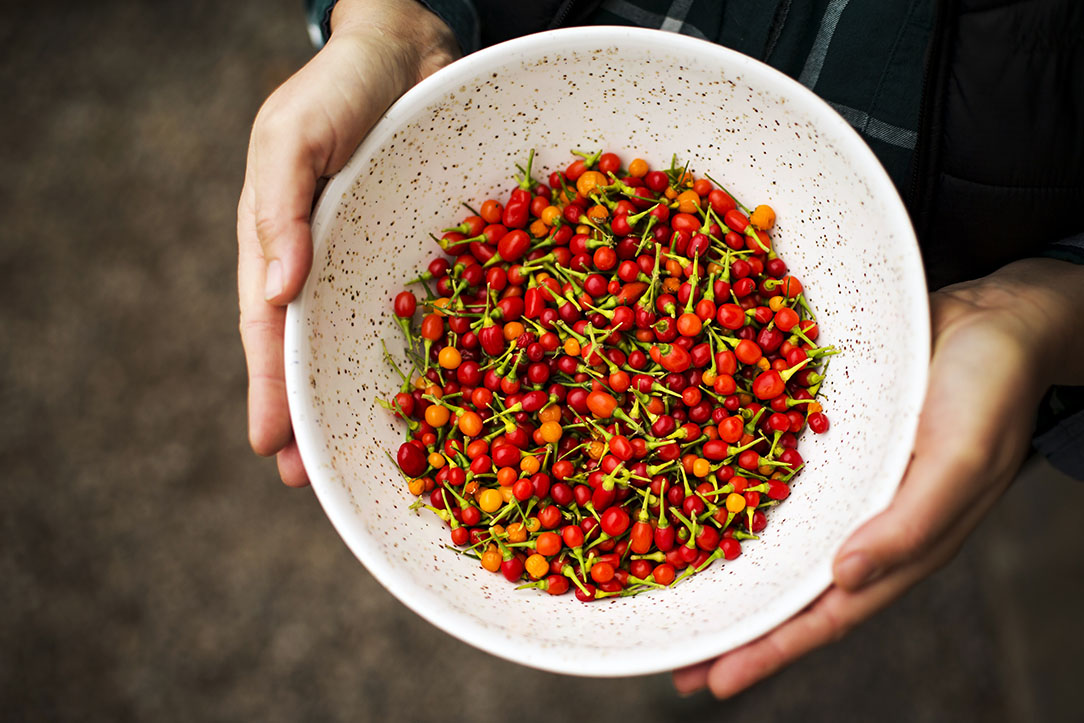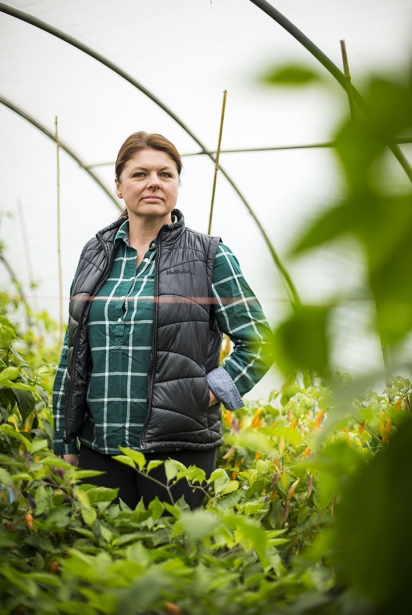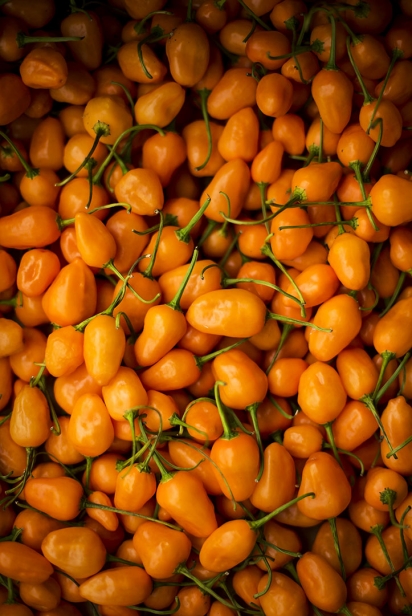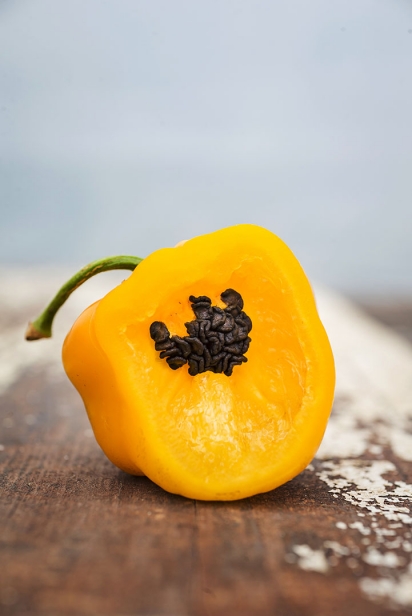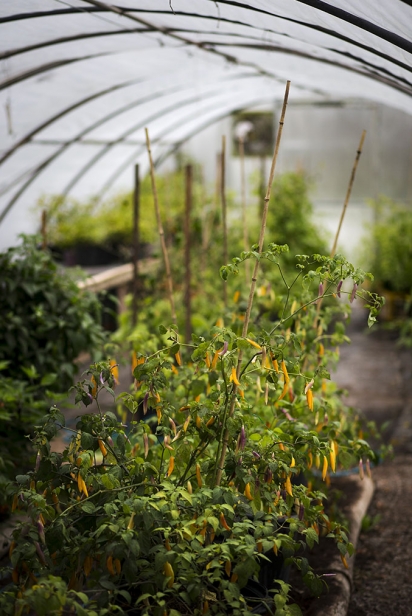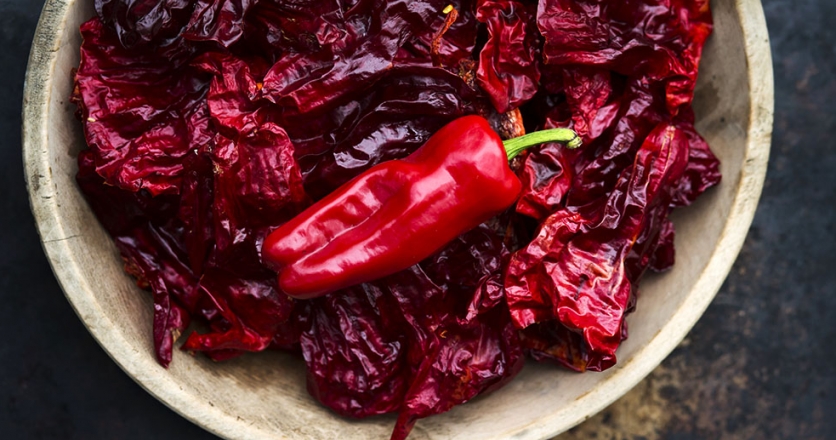A World of Peppers Under One Roof
Ask Shirley Ladouceur what her favourite hot peppers are and the Niagara farmer won’t hesitate to answer. “I love the Syrian peppers,” Ladouceur says. “I love Aleppo — the flakes. I use them all the time.”
But then she pauses, just long enough for a quick breath, before adding her adoration for Challuaruro, a Peruvian chili, that ripens early and boasts juiciness that lends itself to hot sauce.
And hot on the heels of that comes mention of Chimayo, considered one of New Mexico’s best chilis. Ladouceur grows four different varieties of the pepper, which offers a flavourful medium heat. She planned to whittle the quartet down to one in her quest to grow only the original Chimayo, but she wound up loving them all so much she reserves space for each in her garden every year.
“I thought I was going to have a hard time distinguishing them,” she explains. “I grew about a dozen and I thought I’d narrow it down, but I like them all.”
The truth is, Ladouceur feels that way about nearly every pepper on the Scoville heat scale. The organic farmer loves chili peppers so much she launched The Spicy Side in 2018, a fiery off-shoot of Chez Nous Farms, the vegetable farm and community-supported agriculture (CSA) venture she runs with her husband Rick, in Stevensville near Fort Erie.
Her affection for the often misunderstood — and more often feared — chili and its spice levels ranging from mellow to merciless took root in 2010 when she started growing hot peppers professionally for the Chez Nous Farm CSA.
In those early days, Ladouceur cultivated the more common capsicums — some jalapeños and maybe a few Hungarian hots. As her tastebuds acclimatized to the pungency of her crops, her obsession with hot peppers grew.
She started carrying chili powder in her purse to perk up restaurant meals. And she began scouring seed catalogues for peppers that didn’t occupy the same grocery store real estate as run-of-the-mill habaneros or Thai bird’s eyes.
“I didn’t grow up eating anything spicy and then I just developed that taste,” Ladouceur says. “I see how important they are to different cultures and it’s fascinating.”
As such, Ladouceur’s deep dive into hot peppers has morphed into public service of sorts. She’s carved a niche for propagating a food so fundamental to cultures and cuisines across the globe that her peppers can make people cry — and not because of the Scovilles they pack.
The floodgates open with Ladouceur’s uncanny ability to reconnect people to their former homelands with flavours that can’t be mimicked by the peppers available in Canada’s more milquetoast produce sections.
“My plant sale is so exciting. People come from Toronto, and they can’t believe they found [the peppers they were looking for.] They’d stand there staring at my list of peppers on the wall and they’d go back [into the greenhouse] and get their peppers. It’s very cool,” she says.
But there is a downside to specializing in hot peppers and it goes beyond sometimes needing to wear gloves to do her job.
The sentimental value and cultural significance of the rarer peppers Ladouceur grows — the Rocoto, the Charapita, the Wiri Wiri — are priceless. But the harvests aren’t always the hot commodities she hopes. As a result, she doesn’t always get a fair price for her work.
Ladouceur has thought a lot about that issue, realizing the passion part of her project doesn’t pay the bills. She’s grown peppers on a handshake and been left holding the harvest at the end of the season with no paycheque. Her stunning crops can also be overlooked at the St. Catharines Farmers' Market, where Rick tends a stall, because people don’t know what — or how hot — they are.
“Everyone on the farm is making more money than me and here I am working just as hard,” Ladouceur laments.
She knows more pragmatic types would have abandoned such a business plan. So to channel her efforts in a way that benefits heat-seekers and her bottom line, Ladouceur has reached out to restaurants she thinks could use one or two different peppers on their menu with the hope it will lead to growing contracts.
She already has a hot-sauce maker on board for next year’s crop. Meanwhile, Dispatch, a St. Catharines establishment that ranked ninth on enRoute Magazine’s 2019 list of Best New Restaurants in Canada, buys Ladouceur’s Syrian and Turkish peppers.
She’s connecting with other restaurants in Montreal and Toronto, too. Hot peppers, she says, can stand up to shipping, giving The Spicy Side a potential national market.
Ladouceur is also making more room on the farm for prolific, fast-growing peppers to avoid losing time and money on slow ripeners that struggle to come to fruition in a Southern Ontario growing season.
Still, for all the challenges, Ladouceur’s love of hot peppers has never gone cold, even in those moments when she’s wondered whether she should rekindle her former love affair with heirloom tomatoes. All it takes is some time in her greenhouse surrounded by her Ají Panca, Boldog paprika or Carolina Reapers for any burning doubt to be snuffed out.
“Even Rick says, ‘No, you need to grow peppers,’” Ladouceur says. “I love this. I race out here every day. I love growing peppers.”
Chez Nous Farm (The Spicy Side)
2192 Stevensville Rd., Stevensville, Ont.
cheznousfarm.com | 905.382.1556
@cheznousfarms | @thespicyside


